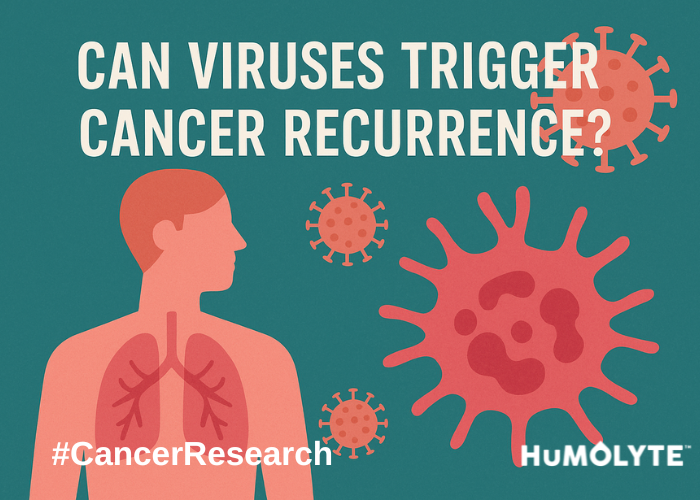When a Virus Awakens Hidden Cancer Cells: What You Should Know
What Did the Study Find?
Scientists have discovered something surprising—and important—for people affected by cancer. A new study shows that certain viruses that affect the lungs, like the flu or COVID-19, may actually cause hidden breast cancer cells in the lungs to "wake up" and start growing again.
In lab studies with mice:
Before infection, there were only a few quiet, hidden cancer cells in the lungs.
Just three days after a flu infection, those cells started to grow more quickly.
Within two weeks, many had multiplied and formed small tumors—and this growth continued for months.
This means a common virus might be able to restart cancer growth in people who thought it was under control.
Why Does This Happen?
The body’s response to the virus seems to play a key role:
A molecule called IL-6 rises when your body fights off infections like the flu or COVID-19. This molecule appears to help wake up the dormant cancer cells. When IL-6 was blocked in mice, the cancer cells stayed quiet.
Changes in immune cells also matter. Normally, certain immune cells (called CD8+ T cells) help destroy cancer. But other immune cells (CD4+ T cells) can interfere and stop them from doing their job. When CD4+ cells were removed, the body was better at keeping cancer cells under control.
What About in Humans?
The researchers also looked at real-world medical records from cancer survivors:
In one group of nearly 5,000 cancer survivors, those who had tested positive for COVID-19 were twice as likely to die from cancer than those who hadn’t gotten the virus.
In another group of over 36,000 women with breast cancer, those who got COVID-19 were about 40% more likely to have their cancer spread to the lungs.
So, just like in the mice, infections in people seem to increase the risk of dormant cancer cells becoming active again.
What This Means for You
Even after cancer treatment, some cancer cells may stay in the body, hiding quietly in places like the lungs. These are called dormant cancer cells. They can stay silent for years—but a respiratory infection could possibly "wake them up" and cause the cancer to come back or spread.
This new research shows just how important it is to protect yourself from viral infections, especially if you are a cancer survivor or currently going through treatment.
What You Can Do
Stay up to date on vaccines.
Getting your flu shot and staying protected against COVID-19 could help lower the risk of infections that might trigger cancer cells.Talk with your doctor.
Ask about your immune system, your risk level, and any extra steps you can take to protect yourself during cold and flu season.Support your immune health.
Eat well, rest, manage stress, and stay active as you're able—these small steps can help your body respond better to infections.Don’t skip check-ups.
Staying in touch with your cancer care team—even during times of high infection risk—is still very important. They can help catch any signs of recurrence early.
A Helpful Reminder
Think of dormant cancer cells like glowing embers in a fireplace—quiet, but not completely gone. A virus acts like a strong breeze that can reignite the flames. While this research is still new, it’s a helpful reminder of how connected our immune system, infections, and cancer really are.
If you’re a cancer patient or caregiver, this study may feel unsettling—but it also gives us power. The more we understand how infections can affect cancer, the more steps we can take to stay safe and informed.
Reference
Respiratory viral infections awaken metastatic breast cancer cells in lungs
For more information on how HuMOLYTE can support your gut health during chemotherapy, visit our product page or consult your health care provider.
This blog was reviewed by Dr. Sourabh Kharait.
This blog is for educational purposes only and is not intended as medical advice. Always consult with your healthcare provider before making any changes to your treatment plan, hydration strategies, or diet. The information provided here is based on general insights and may not apply to individual circumstances.

